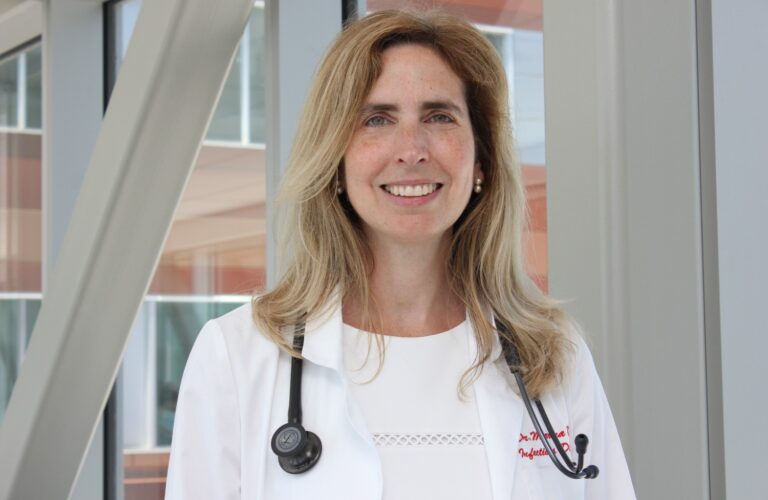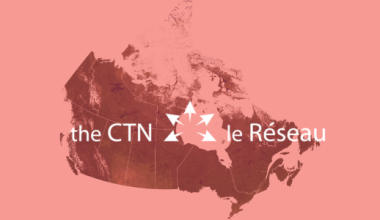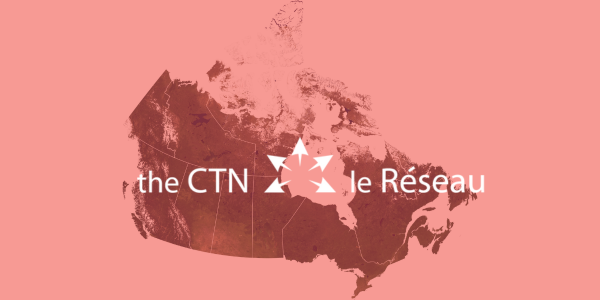
Jacquie at the International Conference of Education, Research, and Innovation
Once Jacquie Sas starts talking about the early days of the CTN, it’s hard to keep up. She throws around all kinds of dates, historic events, and names — some long gone, some who have moved on and become well-known elsewhere, some who are still part of the organization. A lot has changed in these past three decades, except Jacquie’s presence. She has been a constant from the beginning.
It all started in 1990. After growing up in Peru, going to school in Paris and working at UNESCO, and then returning to Peru to work for the Canadian International Development Agency, Jacquie immigrated to Vancouver. She was working for a mining company at that time. A friend told her about an ad in the newspaper looking for a Francophone for the Canadian HIV Trials Network. She laughs, “I had no idea what a trial was or anything!”
Jacquie applied and ended up becoming one of the CTN’s very first employees.
“At the beginning, we didn’t know what the heck we were getting into or what we were doing. There was a kitchen table and a huge phone. That was it.”
Dr. Joel Singer, current Program Head of Data and Methodology, was also one of the very first CTN employees. He remembers when Jacquie came on board. “She was clearly a person who loved life, had a great ‘joie de vivre’ and gave her all to what she was doing at work. She was very outgoing and quickly befriended investigators across the CTN.”

Jacquie and Dr. Joel Singer, two of the first CTN employees
Up until then, Jacquie’s knowledge of HIV/AIDS was limited, though she had many friends and colleagues who had gotten sick. Some of them died. All she knew was it was a deadly disease surrounded by stigma. “Don’t forget, at the beginning, no one would have talked about their status,” she explains. “Parents would kick their HIV-positive children out of the family. They separated their forks and knives because anyone with HIV was considered ‘infested’. It was terrible.”
One of her first jobs was to translate a video into French. The VHS tape had been created to help familiarize family doctors with sex between men. This was brand new for Jacquie. “I had no idea what certain words were, so I had to call AIDS Vancouver to learn about rimming and golden showers. But it was all education. And I like to joke, in a way, I’ve been in the pants of people for 31 years!”
The CTN started ramping things up, one step at a time. There were talks and conferences to increase the organization’s visibility, and open houses in different provinces, all organized by Jacquie. Patients were recruited via satellite offices in each region, but that had its own challenges, according to Jacquie. “The only people who were open about their HIV status at the time were people in the sex trade. I remember in Toronto, the Prostitutes’ Safe Sex Project sitting around a small boardroom table.”
That inspired the formation of the CTN’s Community Advisory Committee in 1993. Jacquie says, “As we went along, it became very clear we needed to work together more closely.”

Jacquie joins the CTN Community Advisory Committee in 2018
Looking back on those early days, Jacquie points out this was before the widespread use of emails and internet. “We used to ship huge binders containing the trials for review to all the members of the various committees. And I remember staying up until 3am, sometimes 6am, transcribing dictations from Dr. Donald Zarowny’s Scientific Review Committee reviews so they would be ready in the morning.” On top of everything, Jacquie proofread all the French material and translations.
By then, activists around the world were already well established and lobbying governments, pleading for new treatments and improved access to treatments, imploring for education in schools, and pushing for an end to systemic discrimination. The AIDS Memorial Quilt was first displayed in 1987. ACT UP was launched that same year. And in 1991, the first annual AIDS Awareness Week was held across Canada. Jacquie recalls joining research colleagues and community activists in street marches, demanding expanded access to treatment.
Then in 1996, the World AIDS Conference came to Vancouver, along with the announcement of a successful treatment — antiretrovirals — that quickly became the new standard of care. It was a major turning point in the HIV epidemic.
At the CTN, the semi-annual meetings had grown significantly. Jacquie’s French-language skills and outgoing personality endeared her to all, and she helped connect the different groups at these face-to-face events. Both Joel and Dr. Sharon Walmsley, CTN National Co-Director, specifically point out Jacquie’s ability to drive a bargain with the hotels, getting as many perks as possible.
“She was the one person who was a constant for the people who are not based in Vancouver and would only see each other at these semi-annual meetings,” explains Dr. Aslam Anis, CTN National Director. “Jacquie welcomed everybody and she was the person they could all count on as the face of the CTN through all these meetings.”

Sharing a smile with CTN Investigator Dr. Sylvie Trottier at the 2005 CTN Fall Meetings
Then Jacquie took over the Postdoctoral Fellowship Program in 2008, which was originally called the Associateship Program. “We had maybe two, three, or four associates at the beginning, and then it started building up,” says Jacquie.
To help expand the program, Jacquie lobbied pharmaceutical companies and other organizations for funds to support more fellows. In 2010, the program added an international fellow. Jacquie then obtained funding for the international postdocs to participate in the 2015 AIDS Conference in Durban and organized a symposium where they were able to present to Canada’s federal minister of health.
To date, there have been 174 fellowships awarded to 107 individuals, and Jacquie remembers almost every one of them.
“I feel that I have served them well, and the postdocs kind of see me as someone they can trust. They ask all kinds of questions, including ‘What should I do with this?’, or ‘What about my career?’. One even asked if they should have a baby now!” laughs Jacquie.

Jacquie with the 2019 postdoctoral fellows and CTN National Co-Directors Drs. Marina Klein and Sharon Walmsley
“Jacquie was responsible for arranging all the reviews of the applicants, but most importantly for shepherding her ‘kids’,” says Joel. “She did it in a very supportive and loving way, which is reflected in the high regard in which she is held by so many current CTN Investigators, many of whom passed through the fellowship program.”
One of those postdoc fellows was Dr. Marina Klein, now the CTN’s National Co-Director. “She immediately struck me as someone who was as nurturing, as she was passionate about the postdocs she supported and the people affected by HIV. As we got to know each other over the years, Jacquie showed herself to have an enormous heart and tremendous dedication to the network, but she also became a warm and kind friend.”
“Jacquie really took ownership of the program and felt responsible for it,” remarks Aslam. “She has made it what it is today, and she should be really proud of this accomplishment.”
Sharon adds, “The postdoctoral program really is Jacquie’s legacy. Her tireless commitment to the fellows, from advocating for them at every meeting, to getting funding, to supporting them emotionally, she was able to get them the support they needed that helped them grow into tomorrow’s researchers.”
“I find it hard to imagine the network without her,” concludes Marina. “Jacquie has been such an integral part of everything for so long. She really shaped how people cared about the work we do and how we do it, in a good way.”

Left: Jacquie with 2014-15 international postdoctoral fellow Dr. Wei Cao and CTN Core Co-Lead Dr. Jean-Pierre Routy. Right: Jacquie, CTN National Director Dr. Aslam Anis, and Chief Administrative Officer Kristin Westland enjoying dinner with the postdoctoral fellows in 2015
When asked what she will miss the most, Jacquie is quick to jump in, “It’s the people. There are so many people I have known for so many years. The Francophones are close to me because we chat in French. I will miss Curtis Cooper’s hugs, Jonathan Angel and his big mouth. I loved the postdoc dinners with Marina, Sharon, Aslam, Kristin, and Joel.”
The pandemic has delayed Jacquie’s retirement plans to travel, but as always, she is approaching this unexpected roadblock with a positive attitude. “I will get an e-bike and discover Vancouver. Now that I don’t have schedules to follow, I am going to enjoy the summer here and enjoy life to the fullest!”

A retirement full of adventures like this! Jacquie and her partner Gabi join Dr. Bertrand Lebouche and his partner Patrick at Porteau Cove, 2018






